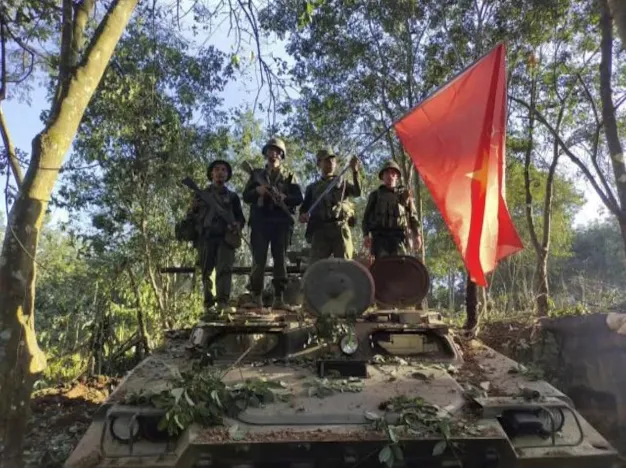-
CENTRES
Progammes & Centres
Location
The military coup has led to a breakdown of the rule of law in Myanmar, creating a conducive environment for criminal activities, especially in border states

For a month now, Shan State, bordering China, has become a focal point of conflict as the ethnic Brotherhood Alliance, composed of the Myanmar National Democratic Alliance Army (MNDAA), the Ta’ang National Liberation Army (TNLA), and the Arakan Army (AA), launched “Operation 1027”. The operation, named after the date it commenced, has seen the MNDAA taking control of Chinshwehaw town, Kunlong, Pansai, and Phaung Sai towns, strategically blocking key highways to impede junta reinforcements. The junta has lost over 150 outposts, facing notable resistance in Monekyat, Nanbeng, and Monekoe.
The combined forces of the Brotherhood Alliance, People’s Defense Force, People’s Liberation Army, Kachin Independent Army, and Burma People’s Liberation Army are creating offensives in different bordering regions of Myanmar, adopting a strategy to seize control of towns and strategic junta bases, overwhelming the junta's air and ground capabilities.
In response, the Myanmar general, Min Aung Hlaing, has pledged retaliation and imposed martial law in eight townships, including Laukkai and Konkyan towns in northern Shan State, that the resistance is eyeing to capture. In the initial phases of the operation, rebel groups achieved complete control over Chinshwehaw, a key trading centre on the Chinese border. From April to the beginning of November 2023, the Chinshwehaw and Muse border crossings facilitated over one-third of the US$5.32 billion in trade with Myanmar's neighbouring countries. Subsequently, the resistant forces seized another strategically important town, Hseni, where the Lashio-Muse and Lashio-Chinshwehaw trade routes intersect, along with capturing another trade gateway—Kyin San Kyawt on the China border in Muse Township, further weakening juntas’s economic hold.
Now, Beijing, which shares a 2,129 km border with Myanmar, has been expressing concern about the escalating situation around its border areas, prompting the closure of border points with Myanmar. The nation has called, personally visiting twice, for an immediate cessation of violence and requested peace, particularly as the fierce conflict occurs at the site where the railway project under the China-Myanmar Economic Corridor (CMEC) is supposed to commence. In response to the perceived potential for more disruptions, the People's Liberation Army (PLA) initiated a series of live-fire exercises along the Yunnan province border with Myanmar on 25 November, marking the first such drills in six years. Analysts view these manoeuvres as a message directed at both Myanmar's military junta and various armed groups, urging a de-escalation of tensions.
It is noteworthy that, in addition to the broader goals of establishing control and ending military rule, the Brotherhood Alliance aims to address online scams near the China-Myanmar border. This concern is shared by Chinese authorities, who have urged Myanmar generals to take action on this issue.
In Myanmar, the military coup, ongoing violence, and armed conflicts since 2021 have led to a breakdown of the rule of law, creating a conducive environment for criminal activities. Transnational organised criminal actors have expanded their operations within the country by collaborating with factions inside the armed forces and various militia groups. A report published recently by the United Nations (UN) estimates that up to 120,000 individuals, predominantly Chinese nationals, have been trafficked into slavery by criminal syndicates working in collaboration with the junta.
Many of the scam centres in Myanmar are located in areas with weak regulation and porous borders, lacking formal law enforcement structures, oversight, and accountability. Thailand has increasingly become a transit country for these operations, with individuals entering Thailand before being moved by traffickers to Myanmar.
One prominent centre for criminal activities has emerged around the Myawaddy region, just across a narrow river from the Thai border town of Mae Sot. A second cluster extends northward through Shan State, traversing the special administered area of Wa State and reaching up to Kokang, which shares its border with China's Yunnan province.
Ethnic militias in these regions possess a rich history of engaging in illicit activities, including drug trafficking, the trade of rare wildlife, and human trafficking, all conducted beyond the reach and sometimes in alliance with Myanmar's military government that contends with a widespread rebellion led by pro-democracy activists.
Individuals recruited for employment at these online gambling and scam centres hail from various Asian countries, with a significant number being unemployed Chinese nationals. These recruits endure unfavourable conditions and face punishment if they fail to meet targets set by the criminal kingpins. The majority of these scams are orchestrated by Chinese criminals with the assistance of local elites and forces, making it challenging for Chinese law enforcement to intervene, given that many of these criminal networks are based in other Southeast Asian nations. Casinos often divert the generated funds and convert them into hard-to-trace cryptocurrencies.
Chinese authorities have employed a multifaceted approach to tackle the issue of online scams near the China-Myanmar border. A multilateral strategy involves collaborative efforts among personnel from China, Myanmar, Thailand, and Laos, pledging to conduct joint special operations to combat gambling fraud and associated crimes. Some successful operations have led to the exposure of scams, arrests of perpetrators, and the protection of victims. The rescue of more than 266 Thais via China on 19 November is a testament to this, yet more consistent and proactive efforts are deemed necessary.
Additionally, China has employed a longstanding bilateral communication strategy, engaging not only with the ruling administration or military junta but also with ethnic armed groups. This approach aims to maintain a balance, securing Chinese regional investments and safeguarding projects under the Belt and Road Initiative (BRI). This border diplomacy serves to uphold China's political influence in the area.
Recent actions, such as issuing arrest warrants for top Wa state officials and the detention of 11 Kokang Special officials with junta ties, highlight China's assertiveness. A warrant for a Kokang Self-administered Zone official linked to the junta, accused of orchestrating scams and causing the deaths of Chinese and Thai citizens in mid-October, resulted in the official taking his own life after arrest by Myanmar military forces on 17 November, while his son and daughters are in custody. These actions underscore China's ability to influence ethnic armies and military forces to enforce compliance within Myanmar, emphasising its significant role and dominance in the region.
Beijing’s steadfast support amid global and regional criticism has proven crucial for the junta in maintaining its economic and political control in a nation grappling with internal turmoil. Consequently, the military generals are actively seeking to foster a stable and close relationship with its influential neighbour, China, in its efforts to apprehend criminal organisations and navigate the challenges it faces. Myanmar officials, till 16 October, have thus far handed over 4,666 Chinese citizens who were allegedly associated with cyber scam syndicates operating along the border. However, Beijing has suspicions about the regime's commitment since they have been unable to penetrate the Kokang areas completely.
By prioritising the eradication of online scams, the Brotherhood Alliance appears to seek Chinese support as they eliminate illegal centres in Kokang, especially Laukkai, and reduce military presence. Scholars assert that the consistent supply of arms and ammunition in the prolonged conflict further suggests backing from certain Chinese quarters, if not the topmost. However, several factors require careful consideration.
The diminishing control of the Myanmar army in the northern region and the potential resurgence of the Myanmar National Democratic Alliance Army (MNDAA) in Kokang imply that significant portions of Myanmar's border with China will fall under the influence of ethnic armed organisations. These groups' growing power and influence will strengthen their position in negotiations. Dependence on China may impact its decision-making during critical times, potentially altering regional dynamics in this geopolitical space.
Additionally, China's increasing influence in the nation's security dynamics raises concerns, emphasising the need for unity among resistance groups to counter any political manoeuvring.
As the region grapples with these challenges, the outcomes will shape the geopolitical landscape, impacting Myanmar and the broader Southeast Asian region. Navigating this intricate web of events requires striking a balance between regional stability, economic development, and the protection of vulnerable populations. Achieving a long-term solution seems quite distant in this complex scenario.
Sreeparna Banerjee is a Junior Fellow at the Observer Research Foundation
The views expressed above belong to the author(s). ORF research and analyses now available on Telegram! Click here to access our curated content — blogs, longforms and interviews.

Sreeparna Banerjee is an Associate Fellow in the Strategic Studies Programme. Her work focuses on the geopolitical and strategic affairs concerning two Southeast Asian countries, namely ...
Read More +